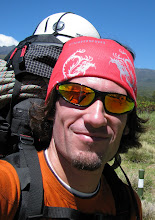Aspetar sport medicine hospital in Doha is a world class medical facility with world class funding and therefore with world class scientists doing world class research related to sports and human performance. Like the one studying effect of altitude on body performance and trying to determine whether it was your head, breath or muscles what stopped you from pedaling further. Why I know all this? Because through Qatar Chain Reaction I volunteered to be a subject in this study
The initial session was easy and fun. I sitting fixed to a special chair and with around 20 different sensors attached to my body measuring various body function like muscle contraction strength and electrical activity, pulse, brain activity, expired gases analysis, etc. I was looking like a Christmas tree!!
First I had to push with my leg against metering arm to determine the muscle maximum strength. In the mean time I was getting “stimulations” (small electric shocks to my head and groin). “Look at the curves” said scientist Olivier He meant of course the muscle activity curve on the computer screen. “Perfect subject” agreed Sebastien. Then we moved to cycling pressure chamber where I had to pedal at 80 rpm with increasing the machine resistance 25W per minute until exhaustion. “Until exhaustion? How do I do that?” I asked naively. “It’s very simple. You cycle until you cannot keep 80!” replied Olivier. “Hmm..we’ll see” I still couldn’t imagine how I could feel
And really…around 350W I started to feel that it is getting tough and at 450W I was just done. Breathing like a steam train I couldn’t push my legs forward. “So this is exhaustion!” I though. Definitely not a pleasant thing!! But this was nothing in comparison to the other three sessions.
Starting with quite tough 8 min warm-up we went to the pressure chamber simulating to me unknown altitude 0, 2000 or 4000 meters above sea, I had to do sprints. With resistance around 160W speed up as quickly as possible to 115 revolutions, keep up for 15 seconds, stop and rest for 45 seconds. Until exhaustion of course!! When I was done we moved to the chair for some pushing and stimulations. And guess what next? The same exhaustion sprinting again in 0 altitude outside the chamber with more “stimulation” at the end as a cheery on the cake. All this usually took around 3 hours.
Unfortunately I don’t know the complete results yet, because the whole study and data evaluation from all 15 subjects will take couple of months, but from what Olivier told me you could guess how it was.
My first altitude was 2000 and I did 33 sprints. I really pushed to my limit and when I got off the bike I was barely walking and dizzy from breathing 170 heart rate through oxygen mask. Awful feeling. After that I did around the same at 0 outside. It was a bit better, because of the altitude, but I was dry like a desert, couldn’t stand, but at least not dizzy from lack of oxygen. There I think it was really the muscle what stopped me.
The second session was at 0. In the chamber I felt more comfortable, so I kept pedaling…and pedaling…still going…pretty easy…man it’s boring…I wanna be exhausted already, but I didn’t want to give up so I kept going. But at the end I think it was a bit of my mind that said “Finish of this nonsense”, because I was there way too long and felt desperately bored. I did 91 sprints there!! 1.5 hours on the bike in the small room J But what was the surprise when I did only 14 after!! So I guess I was not cheating after all and I really drained my muscles in the chamber so there was nothing left for later.
The last one was at 4000 meters. To make the story short I did 15 sprints in the room only J But I still felt terrible. Out of breath, dizzy, a bit stomach sick…you don’t get up to exhaustion often in normal life or training and especially not four times in two weeks!! But as a “Perfect subject” I did 61 after. “This is how it should be” said Olivier and explained “Because you didn’t have enough oxygen at 4000 for your brain it stopped you early to protect itself from being damaged, but muscle was still fresh so that’s why when at 0 there was oxygen enough, the muscle gave the rest”
At the end, when everything is behind me I have to say, that I’m happy that I participated. It was excellent training, I learned something about myself that will help me improve more and have some data to compare with statistics…especially those QCR ones ;)
It was kind of painful, but you know...
“NO PAIN, NO GAIN”




No comments:
Post a Comment